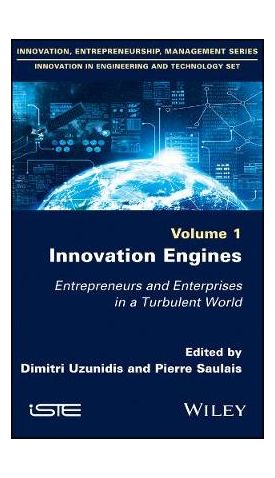אנו משתמשים ב-Cookies כדי לשפר את החוויה שלך. כדי לקיים ההנחיה החדשה של e-Privacy, עלינו לבקש את הסכמתך להגדיר את ה-Cookies. קבלת מידע נוסף.
815.00 ₪
Innovation Engines
815.00 ₪
ISBN13
9781786301642
יצא לאור ב
London
זמן אספקה
21 ימי עסקים
עמודים
220
פורמט
Hardback
תאריך יציאה לאור
23 במאי 2017
In an uncertain economy where business risk is significant, the company tends to rely more on its environment than to invest, for example, in all steps of technological creation; This can be explained by the fact that investments in the acquisition (ownership) of production resources are less expensive than those implied in the formation of these resources; which also explains the attractiveness (in an open economy) of regions with abundant scientific and technical resources. To understand and analyze the innovation process in order to better design and launch new goods, services and technologies, one has to consider the creative dimension of the individual, the business and the organization in general. In new approaches to innovation, the entrepreneur and the company are analyzed through their skills, and their function of resource generation; Innovation thus becomes endogenous, gradual or radical, integrated in a complex process with many feedbacks and interactions. The innovative organization (small or large) is presented in this book as a dynamic system composed of specific and diverse skills (including those of the contractor, engineers or managers).
By acquiring, combining and mobilizing these skills, the innovative agent (entrepreneur or company) can create technological resources and develop relations with its environment. Hence the importance of management in design, implementation, protection of intellectual property as well as of the development of new goods, services and technology, commercial and organizational models.
| עמודים | 220 |
|---|---|
| פורמט | Hardback |
| ISBN10 | 1786301644 |
| יצא לאור ב | London |
| תאריך יציאה לאור | 23 במאי 2017 |
| תוכן עניינים | Introduction xi Dimitri UZUNIDIS and Pierre SAULAIS Chapter 1 Innovation Strategies and Entrepreneurial Dynamics 1 Michel MARCHESNAY 1.1 The entrepreneur: the key player in innovation 2 1.2 Industrial analysis of innovation 3 1.3 The three eras of industrial capitalism 5 1.4 Extensive and intensive stages 7 1.5 Innovation: between order and progress 8 1.6 Innovation and the "technical age": a Pandora's box? 11 1.7 The major strategic choices 15 1.8 The spread of innovation 18 1.9 Conclusion 21 1.10 Bibliography 22 Chapter 2 Innovative Milieus and Innovative Entrepreneurship 25 Corinne TANGUY and Dimitri UZUNIDIS 2.1 The innovative milieu and proximities 27 2.2 The innovative milieu and entrepreneurs 32 2.3 Conclusion 37 2.4 Bibliography 38 Chapter 3 Start-up Founders and Support for Technology Entrepreneurs 43 Gerard A KOKOU DOKOU 3.1 Putting entrepreneurial identity into theoretical perspective 45 3.2 Demonstration of the components of the identity of a start-up entrepreneur 51 3.3 Conclusion 62 3.4 Bibliography 63 Chapter 4 The Importance of Entrepreneurial Creativity 73 Marc JAILLOT 4.1 Creativity, innovation and entrepreneurial context 74 4.2 What does the economic reality teach us? 80 4.3 Discussion 83 4.4 Conclusion 86 4.5 Bibliography 87 Chapter 5 From Ideation to Product Launch 91 Maggy PERRIER and Audrey DEPEIGE 5.1 The quest for continuous renewal: collaborative innovation within business strategy 92 5.2 An internal environment supporting innovation 98 5.3 Managing invention through innovation: building a strong intellectual property management process to maintain a competitive advantage 101 5.4 Conclusion 104 5.5 Bibliography 105 Chapter 6 The Patent: A "Swiss Army Knife" for Invention and Innovation 111 Yann de KERMADEC 6.1 Invention, innovation and intellectual property: some references 112 6.2 The means tree: a language for innovation and good use of patents 116 6.3 The patent system: a model for the management of knowledge for innovation 124 6.4 Conclusion 129 6.5 Bibliography 131 Chapter 7 Invention, Innovation and Intellectual Property Rights 133 Pierre SAULAIS 7.1 Innovation 134 7.2 Invention and the ability to invent 141 7.3 The inventive intellectual corpus 143 7.4 Analysis of the links between invention, innovation and the inventive intellectual heritage 151 7.5 The nature of bridges between knowledge areas 157 7.6 Conclusion 159 7.7 Bibliography 160 Chapter 8 Commitment to an Industrial Evolution 165 Theodor FELEZEU 8.1 Findings, shared feelings and risks incurred 166 8.2 Focus on the new industrial order 172 8.3 Corollaries: impacts on innovation 186 8.4 Conclusion 188 8.5 Bibliography 188 List of Authors 193 Index 195 |
| זמן אספקה | 21 ימי עסקים |



Login and Registration Form